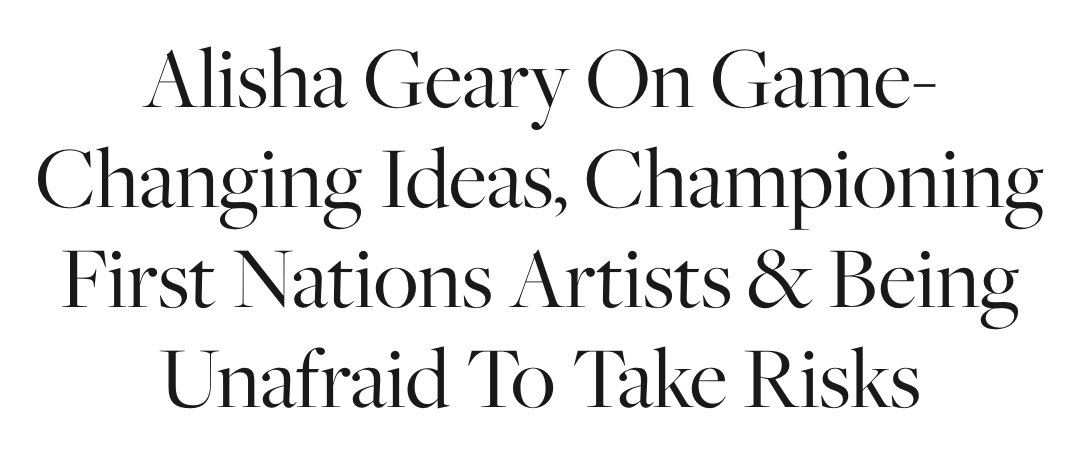

If there were one phrase to perfectly encapsulate the inspiring talent that is Alisha Geary, it’d be game-changer. The “serial entrepreneur”, as she’s been so perfectly dubbed, has admittedly always had that determined spirit, be it creating her own card game, lending her expertise to a skincare brand focused on Australian ingredients, writing fiction books in her spare time, or appearing as the keynote speaker at Her Black Book’s International Women’s Day event, Up Close, powered by Samsung, Geary has always found a means to continue innovating and inspiring.
“I’ve always had that mindset,” Geary says. “I just have a creator mindset. I’ve always loved creating things that weren’t there before.”
Despite the 27-year-old — a descendant of three First Nation and Torres Strait Islander clans, Gurang Gurang, Deibau, and Wuthathi — having found ways to fuel that innate creativity from an early age, it wasn’t until being offered an Indigenous Scholarship at Queensland’s Bond University that she would ultimately find her “Ikigai”, or purpose. Geary was asked to be a tour guide for the University’s extensive collection of First Nations artwork (the largest private collection in the country), an experience that would not only immerse her in culturally rich works steeped in symbolism and history, but inspire her first business: Faebella.
The activewear label incorporates First Nation and Torres Strait Islander artwork, culture and stories onto its designs, with the mission to give Indigenous artists across Australia the opportunity to sell their art beyond the canvas.

“It happened quite organically,” Geary explains of the brand’s inception. “It was actually by taking guests through the artwork and learning about all the stories, that I really realised the significance of Indigenous artwork.”
Faebella has since worked with seven Aboriginal and Torres Strait Islander artists to create nine collections, a feat Geary is immensely proud of.
So naturally, as the brand began to grow and Geary continued to shine a much needed spotlight on First Nation artists in her community, others began to reach out to see how they too, could feature these artworks in their designs or products. While it admittedly began to eat up most of her time, these conversations are where Geary’s next big idea started to bubble.
“I realised there was a gap in the market, particularly around art licensing,” she recalls. “There were no platforms for artwork in particular, particularly not Indigenous artwork, so I thought — I should just make one.”
Geary did exactly that, launching Provvy, a tech platform that expertly merges ones of the world’s oldest traditions with modern technologies, empowering artists to claim ownership of their work, as well as providing a new means of monetisation by tokenising pieces into NFTs and selling usage rights.

An NFT — non-fungible token — is a digital asset that represents real-world objects (like art), which are bought and sold online, with each item given a unique and clear identity attached to it. As Geary explains, “NFTs are something that assigns an identity of ownership to something indisputably”, an aspect she says is immensely beneficial to artists whose works can often go uncredited or worse, stolen.

Despite seeing success from the platform early on, Geary says it didn’t come without its challenges — especially when it came to getting First Nations artists on board with the idea of NFTs. And while Provvy isn’t exclusive to Indigenous artists, Geary says she’s on a mission to bring as many onto the platform as she can, “ensuring they’re early to take and not late, as they usually are.”
“With Indigenous artists, in particular, a lot of them don’t have excellent access to technology or the education necessary to have formed a quick understanding — so explaining what licensing is, is hard. Nevermind then trying to explain BlockChain and trying to get them to do something that they’ve never heard of before,” Geary notes.
That being said, the platform has come with its incredible rewards too, most notably when artists Geary has introduced to the platform begin to make a livable wage.
“Art can be really personal, and there’s a lot of passion that goes into it, particularly with Indigenous artists who may be recording stories that they were told from their elders, and had been told for thousands of years. When I illustrate examples of artists who’ve gone on to make quite a lot of income from NFTs, there’s a lot of excitement there to think that they can just be artists, and they no longer have to balance their art creation time in between work and family life.”

Throughout all her experiences, there’s one clear thread that is weaved through everything Geary does — her firm willingness to put herself forward.
“I think there’s a good reason why I’m doing the things I’m doing, it’ll help a lot of people. Me feeling nervous about what could happen is not enough to stop me from putting my hand up.”

As for what’s next for Geary — it’s a big move to the U.S. in June to further expand the Provvy platform.
“It’s exciting and scary, but I’m just going to do it to give my startup the best chance of success.”


